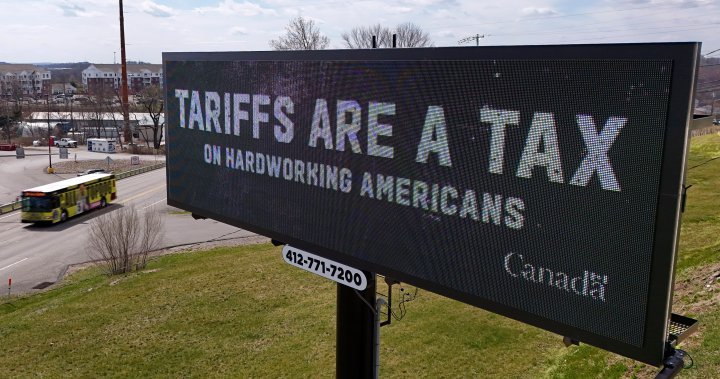Breaking News
Trump tariffs not large enough to trigger recession so far in Canada: RBC – National

U.S. President Donald Trump’s “dizzying” tariffs against Canada are causing great uncertainty in the Canadian economy, but they may not be enough — so far — to trigger a recession, a new report from the Royal Bank of Canada said.
“The start and stop of trade threats and actions from the U.S. have been dizzying, but as much as the uncertainty has intensified, U.S. tariffs implemented so far have not been large enough to cause a recession in Canada,” the report by Nathan Janzen and Claire Fan, published Monday, said.
The report further said this was because the “vast majority of U.S. imports from Canada that are USMCA/CUSMA compliant were quickly exempted” from Trump’s broad-based sweeping tariff of 25 per cent on all Canadian goods.

“The additional steel and aluminium tariffs implemented on March 12 are large, but products impacted account for a relatively small share (about 4%) of Canadian exports to the U.S,” the economists said.
They added that while the auto tariffs, which are scheduled to go into effect this week, will have an impact, certain carve-outs could mean relief for Canada’s auto industry.

Get daily National news
Get the day’s top news, political, economic, and current affairs headlines, delivered to your inbox once a day.
“Most motor vehicle parts are (critically) not included in the initial auto tariff announcement and the value of U.S. intermediate products embodied in those finished vehicles, accounting for roughly half of the total value in Canada’s case, are set to be excluded,” the report said.
RBC noted there were also signs of movement in the Canadian economy.
Consumer and business confidence in the economy were starting to pull back, the report noted, with consumer confidence hitting all-time lows in March.
The report added that while Canada has seen targeted tariffs against it, the so-called “reciprocal” tariffs scheduled from the U.S. for Wednesday are global.
“A smaller tariff rate gap between Canada and other countries/regions could also arguably be a less damaging scenario for Canada than the current status quo,” the report said, with status quo meaning Trump’s broad-based tariffs against Canada and only a small number of other countries.
© 2025 Global News, a division of Corus Entertainment Inc.
-

 Destination8 months ago
Destination8 months agoSingapore Airlines CEO set to join board of Air India, BA News, BA
-

 Breaking News9 months ago
Breaking News9 months agoCroatia to reintroduce compulsory military draft as regional tensions soar
-

 Tech News11 months ago
Tech News11 months agoBangladeshi police agents accused of selling citizens’ personal information on Telegram
-

 Productivity11 months ago
Productivity11 months agoHow Your Contact Center Can Become A Customer Engagement Center
-

 Breaking News9 months ago
Breaking News9 months agoBangladesh crisis: Refaat Ahmed sworn in as Bangladesh’s new chief justice
-

 Toys11 months ago
Toys11 months ago15 of the Best Trike & Tricycles Mums Recommend
-

 Guides & Tips9 months ago
Guides & Tips9 months agoHave Unlimited Korean Food at MANY Unlimited Topokki!
-

 Gadgets3 months ago
Gadgets3 months agoSupernatural Season 16 Revival News, Cast, Plot and Release Date


























